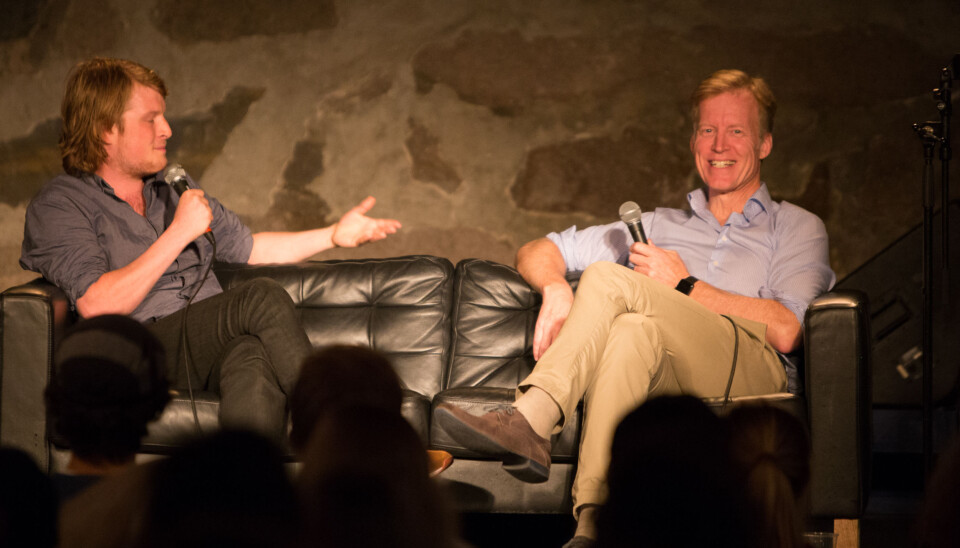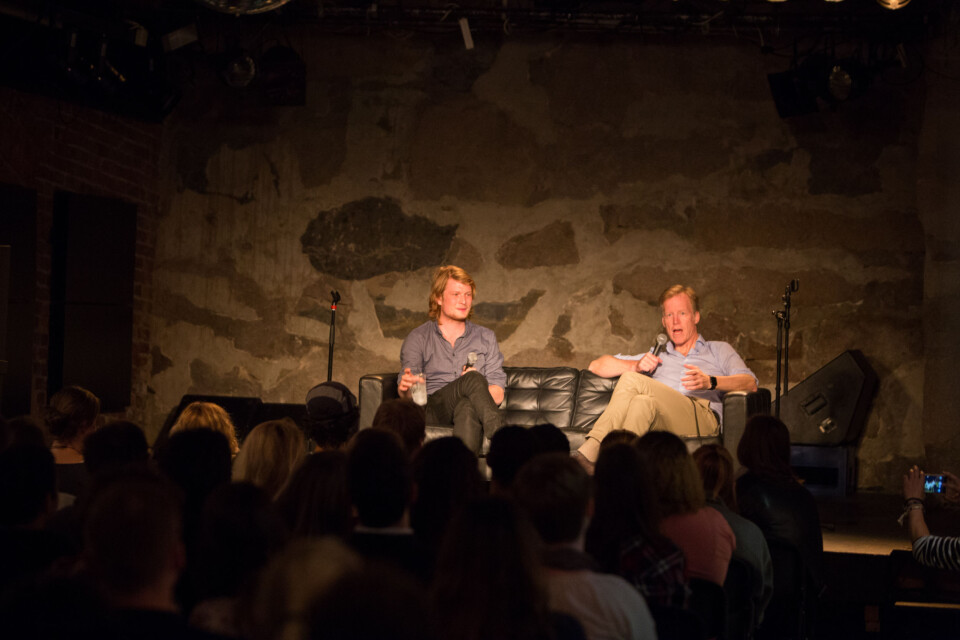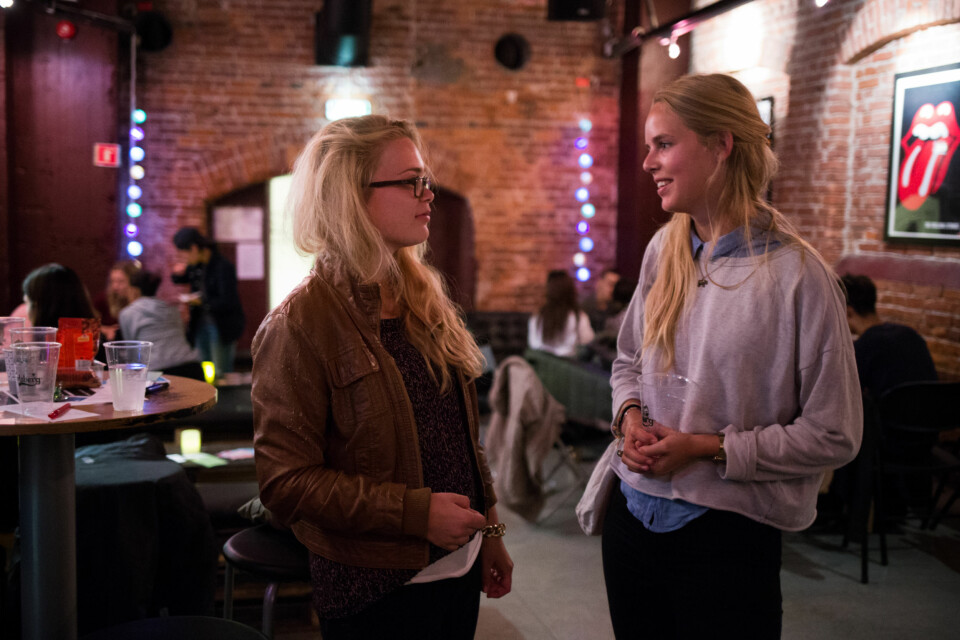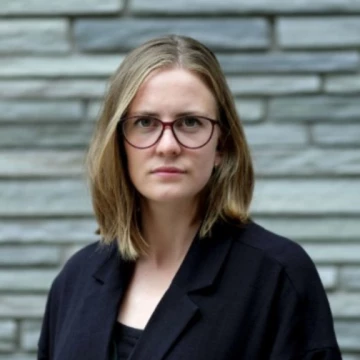
Personal Curt Rice at Language Café
The international students got to meet the linguist, the feminist, the immigrant and the principal Curt Rice at Samfunnet Bislet during the Language Café.
OBS! Denne artikkelen er mer enn tre år gammel, og kan inneholde utdatert informasjon.
Thursday evening the international section at Oslo and Akershus University College of Applied Sciences (HiOA) organized their Language Café for the first time this semester. This time it was a part of «Septemberdagene», the international festival at HiOA, and is to take place every first thursday of the month for the rest of the semester.
— The most important thing when learning new languages is to be able to make a fool of yourself, and learn from the others around you, says Enzo Rossi (picture below) from the international section.

Introducing the Language Café, there was a relaxed «Q and A» (Questions and Answers) with HiOAs new principal, Curt Rice, at Samfunnet Bislet. Interviewer was Helge Schwitters, officer for international affairs at the Norwegian Student Organisation (NSO).
Cultural differences
Norwegians have such a huge comfort zone; they don't even let the glasses touch when they cheer.
Curt Rice
The first thing Schwitters wants to know was how Rice’s first month as head of HiOA has been.
— Well, I have met a gazillion people and got to know the institution. Some days I think «What is this job? I don’t really do anything, I just walk around and talk to people», but other days I think «This job is great, all I have to do is walk around and talk to people!», Rice replies, to laughter from the students.
Most of the students in the old Frydenlund basement are international students, and since Rice has lived in the USA, Norway and the Netherlands, one of the main topics this evening is cultural differences.
When Rice started his job in Tromsø in the early nineties, he was surprised by how early Norwegians left work to spend time at home.
— I used to walk around in my office, thinking deep thoughts, as I am used to do, and at 16:30 I was surprised to see that the office was empty. «Where is the secret pub they are all going to, but not telling me about», I thought. But as it turned out, they were at home, having dinner with their families.
Communicating with silence
Another characteristic about the Norwegian people, which made several of the international students nod in agreement, was the way they communicate with silences.
— Norwegians speak with pauses. Normally when people stop talking, it means that others can start talking, but with Norwegians it is different. They are simply taking very long pauses with the intention of continuing. And they have huge comfort zones. They don’t even let the glasses touch when they cheer, he says, raising an imaginary glass.

Read also: Last semester’s Language Café
Under the topic of languages, Helge Schwitters from NSO also commented on Rice’s accent.
— I’m not sure if the international students here are aware of it, but you speak with a kind of funny accent, that is a combination of an american accent and close to the dialect they speak in Tromsø, in the north of Norway. How did that happen, Schwitters asks.
— Now I got the opportunity to introduce a word that might be new to some of you, the word «idiolect». It is used to describe how one particular individual speaks. Mine is a result of me being from the United States and moving to Tromsø, the principal and professor of linguistics answers.
Got to be political
Even though this event had an unofficial tone, and the idea was for the students to meet Rice on a different arena than usual, he got the opportunity to advocate his plan to turn HiOA into a university.
— Internationalisation is important on our way to build a bigger university, we have to include more international findings and new knowledge in the curricula. To make students graduating from HiOA more comfortable in meeting an internationalised proffesional world, it is important to make the education more international as well.
He also gets to talk about his involvement in gender equality, when he is asked to talk about the differences between Norway and the Netherlands.
— First of all, the Netherlands is flat. Also, it is a country that appears to be liberal, but it is in fact super conservative. For instance, very few women are professors, and women have a hard time getting a career. Dutch children are sent home from school in the middle of the day to have lunch, and who do you think has to be there to make sure that is happening, says the principal and feminist.
He asked the dutch students present to contradict him if they thought he was wrong, but a dutch student Khrono talked to, Esther Snel (picture below, on the left), did not feel the need to.

— What he said about women and how flat the Netherlands is, was about right, Snel thinks.
Tips for international students
Rice also had some tips for international students on how to get to know Norwegians.
— Take a part-time job, join a faith community, or join one of the student organisations. I hear they are looking for good lacrosse-players, and that the gaming organisation is dominated by women. So you should check that out.
And if all that fails, Rice has got a plan B.
— The key is alcohol. Preferably in large quantities, he says.
— But alcohol is expensive, Schwitters points out.
— Yes, it is hard to get to know the Norwegians.







Logg inn med en Google-konto, eller ved å opprette en Commento-konto gjennom å trykke på Login under. (Det kan være behov for å oppdatere siden når man logger inn første gang)
Vi modererer debatten i etterkant og alle innlegg må signeres med fullt navn. Se Khronos debattregler her. God debatt!